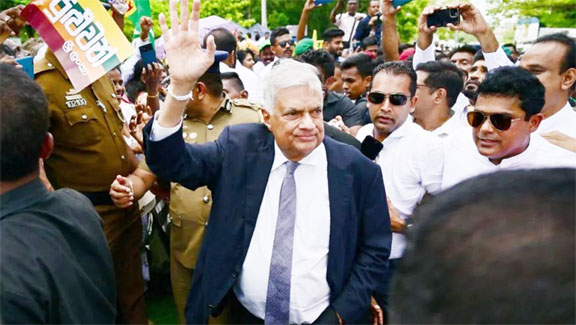Agency :
Sri Lanka votes in a presidential election next month, the first since the country’s unprecedented economic crisis forced Gotabaya Rajapaksa from office in 2022, with incumbent President Ranil Wickremesinghe facing formidable opposition.
Here are the five key contenders for the September 21 poll in the majority-Buddhist island nation of around 22 million people.
Right-wing liberal Wickremesinghe is leveraging his economic management skills to secure re-election for a five-year term.
The 75-year-old lawyer, a six-time prime minister, was elected by parliament in July 2022 to replace Gotabaya Rajapaksa, who resigned after months of street protests over economic mismanagement and corruption.
Since taking over, Wickremesinghe has negotiated a $2.9 billion bailout loan from the IMF, doubled personal taxes, frozen state employment, and cut energy subsidies. He vows to continue the tough austerity measures he says are essential for a full economic recovery.
He leads the United National Party (UNP), but has presented himself as an independent candidate hoping for broader support.
Opposition Leader, 57-year-old Sajith Premadasa, is a former ally of Wickremesinghe turned nemesis.
The son of long-serving prime minster and president Ranasinghe Premadasa, he entered politics after his father was assassinated in 1993 by a Tamil Tiger suicide bomber. A keen cricketer, he studied in Britain — including at the London School of Economics.
He was deputy leader of the UNP with Wickremesinghe, but split in 2020 to form the Samagi Jana Balawegaya (SJP) party and has accused his ex-comrade of being dictatorial.
Both men are ideologically aligned, espousing free-market policies, but Premadasa has pledged to reduce the income taxes raised by Wickremesinghe.
He lost the 2019 presidential poll but performed better in the August 2020 parliamentary elections, becoming leader of the opposition after his party won 54 seats. Wickremesinghe’s party won only one seat.
The leader of the National People’s Power (NPP) party, 55-year-old Anura Kumara Dissanayaka is also committed to the IMF bailout program negotiated by Wickremesinghe, but opposes privatization.
He also contested the 2019 presidential race, securing just over 3% of the vote. Dissanayaka says he wants to attract voters fed up with traditional politicians and is regarded a dark horse with potential to stage an upset.
The 38-year-old scion of the powerful Rajapaksa family is a last-minute entrant who has dimmed Wickremesinghe’s prospects, as he had expected their support.



